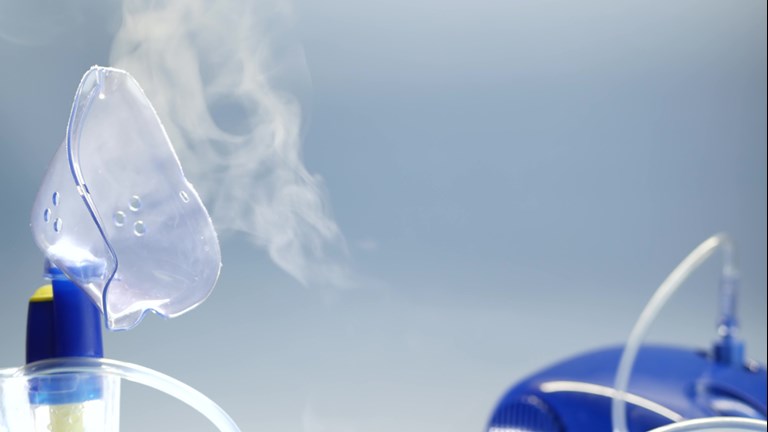Ever wondered what a nebuliser is? We’ve put together a guide to explain what a nebuliser is, when it should be used, the potential benefits and side effects.
What is a nebuliser and what does it do?
A nebuliser is a machine that delivers high doses of medicines easily and efficiently. It works by changing a specially formulated liquid medicine into a fine mist that is inhaled through a mask or mouthpiece.
A nebuliser consists of four parts: the nebuliser chamber (small plastic container), the nebuliser machine (air compressor), a length of air tubing, and a facemask/mouthpiece. The air compressor pushes air through the liquid medicine held in the nebuliser chamber. The mist is inhaled through the connected facemask or mouthpiece.

Why are nebulisers used?
Nebulisers can help to treat certain lung conditions including:
- Severe asthma
- Chronic obstructive pulmonary disease (COPD)
- Cystic fibrosis
- Bronchiectasis
- Pneumonia
When should you use a nebuliser?
Handheld inhalers are the most common way to take an inhaled medication, but sometimes a nebuliser is better, for some types of patients and conditions
A nebuliser might be used to give you an inhaled medication to clear your airways or to treat infections:
- in an emergency, if you are struggling to breathe and need a high dose of your reliever medicine - paramedics or hospital staff may give you a reliever medicine through a nebuliser.
- at home, if your condition is severe, and you are unable to use an inhaler or inhalers are not as effective as nebulised medicine.
- if you can’t use a normal inhaler because of another health condition, such as arthritis.
A nebuliser can also be used to treat young children if they are unable to use another device.
What types of nebulisers are available?
There are many types of nebulisers available, but the three main types are:
- Jet: Jet nebulisers use compressed gas to make a medicinal mist - tiny particles of medication in the air.
- Ultrasonic: Ultrasonic nebulisers make a medicinal mist through high-frequency vibrations. The particles are larger than with a jet nebuliser.
- Mesh: Mesh nebuliser release the smallest particles. Liquid passes through a very fine mesh to form the medicinal mist.
Nebuliser medicines are usually delivered through a face mask. However, some people may be advised to use a mouthpiece as this can lessen side effects. Mouthpieces may also be the best way to deliver maximum medicine doses. Always check with a GP or health care professional if you’re unsure which to use.
What are the benefits of using a nebuliser?
Sometimes a nebuliser is more beneficial than using a standard inhaler with a spacer device.
Firstly, a nebuliser’s design allows a large amount of medication to be inhaled in one go which can provide more effective treatment for some. They can also be used for longer amounts of time to allow more medicine to flow into the lungs.
Nebulisers can often be easier to use. Unlike inhalers which require a person to breathe in when releasing the medication, the medication contained within a nebuliser will flow on a continuous basis. This means you’re able to breathe normally during treatment.
Always contact your GP or pharmacist if you’re unsure about which nebuliser is right for you or whether it is appropriate for you to use. It is not always appropriate to use one if your inhaler technique is good.
Are there any side effects?
Higher doses of medication delivered through a nebuliser can cause some side effects. The most common side effects experienced by using medicines through a nebuliser are:
- Rapid heartbeat
- Mild tremor
- Dry mouth
- Headaches
If there are any symptoms that last more than 30 minutes or are especially problematic, you should contact your GP or 111 for medical advice. You should always refer to the drug information sheet for your medicine side effects.
What medication is used in a nebuliser?
Medications that are commonly administered through a nebuliser include bronchodilators (for example, salbutamol), anticholinergics (for example, ipratropium bromide), corticosteroids (for example, beclomethasone) and normal saline.
Using a nebuliser at home
For most people, even those with acute or severe asthma, using an inhaler and spacer will work sufficiently. This explains why GP’s and medical professionals do not routinely suggest using a nebuliser at home.
However, there are some occasions where a nebuliser is suitable and beneficial to use at home, as long as you are given a set of instructions on how and when to use one. These could include:
- You regularly require high amounts of preventer medication to control severe symptoms.
- There is a risk of a severe asthma attack occurring and you might need quick access to medication.
- You have explored different inhaler types and treatment options that haven’t been beneficial. This could be due to having another health condition too, such as arthritis.
What is the difference between a nebuliser and an inhaler?
Inhalers deliver short bursts of medicine quickly and easily via a portable, handheld device that is manually operated by the user. The most common type of inhaler is a metered-dose inhaler (MDI). However, inhalers are often used incorrectly. Improper use can make the medicine ineffective. If you are unsure how to use your inhaler, or having any difficulties, you should speak to your pharmacist, doctor or respiratory nurse who will be able to help.
Alternatively, nebulisers turn liquid medication into an easily inhaled mist that is more efficiently delivered directly into the lungs. Nebulisers vary in type but rely on a power source, such as an electrical outlet or rechargeable battery to function. It can take up to 10 minutes for the full dose of the medication to be delivered via the nebuliser – but it starts getting into your body very quickly.
Where can I find more information about nebulisers?
Your GP or pharmacist will be able to help, and there are online resources such as the ones below:
Asthma UK: https://www.asthma.org.uk/advice/nhs-care/emergency-asthma-care/nebulisers/
British Lung Foundation: https://www.blf.org.uk/support-for-you/nebulisers
